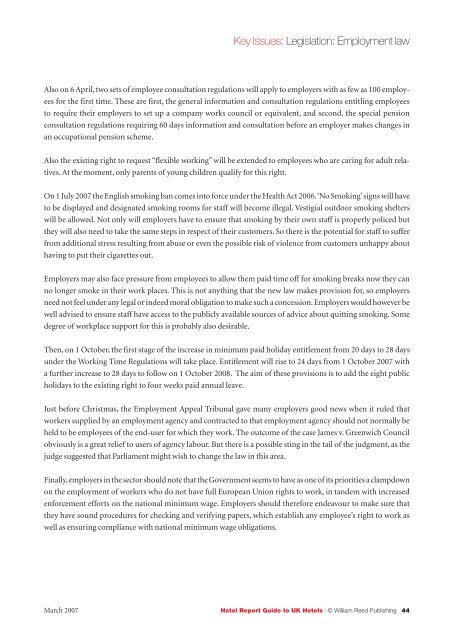1 Hotel cover.indd - Nicola Cottam
1 Hotel cover.indd - Nicola Cottam
1 Hotel cover.indd - Nicola Cottam
You also want an ePaper? Increase the reach of your titles
YUMPU automatically turns print PDFs into web optimized ePapers that Google loves.
Key Issues: Legislation: Employment law<br />
Also on 6 April, two sets of employee consultation regulations will apply to employers with as few as 100 employees<br />
for the first time. These are first, the general information and consultation regulations entitling employees<br />
to require their employers to set up a company works council or equivalent, and second, the special pension<br />
consultation regulations requiring 60 days information and consultation before an employer makes changes in<br />
an occupational pension scheme.<br />
Also the existing right to request “flexible working” will be extended to employees who are caring for adult relatives.<br />
At the moment, only parents of young children qualify for this right.<br />
On 1 July 2007 the English smoking ban comes into force under the Health Act 2006. ‘No Smoking’ signs will have<br />
to be displayed and designated smoking rooms for staff will become illegal. Vestigial outdoor smoking shelters<br />
will be allowed. Not only will employers have to ensure that smoking by their own staff is properly policed but<br />
they will also need to take the same steps in respect of their customers. So there is the potential for staff to suffer<br />
from additional stress resulting from abuse or even the possible risk of violence from customers unhappy about<br />
having to put their cigarettes out.<br />
Employers may also face pressure from employees to allow them paid time off for smoking breaks now they can<br />
no longer smoke in their work places. This is not anything that the new law makes provision for, so employers<br />
need not feel under any legal or indeed moral obligation to make such a concession. Employers would however be<br />
well advised to ensure staff have access to the publicly available sources of advice about quitting smoking. Some<br />
degree of workplace support for this is probably also desirable.<br />
Then, on 1 October, the first stage of the increase in minimum paid holiday entitlement from 20 days to 28 days<br />
under the Working Time Regulations will take place. Entitlement will rise to 24 days from 1 October 2007 with<br />
a further increase to 28 days to follow on 1 October 2008. The aim of these provisions is to add the eight public<br />
holidays to the existing right to four weeks paid annual leave.<br />
Just before Christmas, the Employment Appeal Tribunal gave many employers good news when it ruled that<br />
workers supplied by an employment agency and contracted to that employment agency should not normally be<br />
held to be employees of the end-user for which they work. The outcome of the case James v. Greenwich Council<br />
obviously is a great relief to users of agency labour. But there is a possible sting in the tail of the judgment, as the<br />
judge suggested that Parliament might wish to change the law in this area.<br />
Finally, employers in the sector should note that the Government seems to have as one of its priorities a clampdown<br />
on the employment of workers who do not have full European Union rights to work, in tandem with increased<br />
enforcement efforts on the national minimum wage. Employers should therefore endeavour to make sure that<br />
they have sound procedures for checking and verifying papers, which establish any employee’s right to work as<br />
well as ensuring compliance with national minimum wage obligations.<br />
March 2007 <strong>Hotel</strong> Report Guide to UK <strong>Hotel</strong>s l © William Reed Publishing 44


